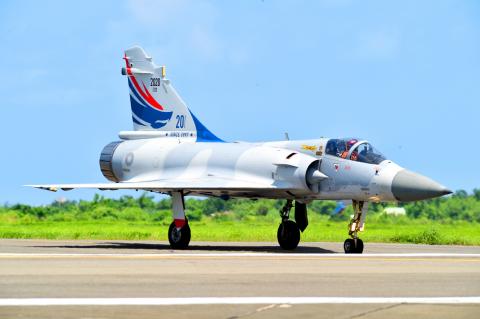A Dassault Mirage 2000 fighter jet crashed yesterday evening during a training mission over the seas north of Taiwan, the Air Force Command said.
At press time last night, a military search-and-rescue helicopter team was still looking for the pilot, Captain Ho Tzu-yu (何子雨) of the 499th Tactical Fighter Wing, the air force said.
The lost fighter, tail code 2040, took off from Hsinchu Air Base yesterday evening for a training mission, it said.

Photo: Chang Chung-i, Tapei Times
At 6:43pm, the jet was flying near Pengjia Islet, about 40 nautical miles (74km) from Keelung, when it vanished from radar and air controllers lost contact with the pilot.
Sikorsky S-70C helicopters were launched at 7:05pm to conduct search-and-rescue operations over the fighter’s last known location and the coast guard was informed of the missing plane.
Ho, 28, was inducted into the air force pilot school in 2011 and has a good military record, the air force said, adding that he has logged 419 flight hours in the Mirage 2000 out of 718 total flight hours.
The nation in 1989 reached an agreement with France to buy 60 Dassault Mirage 2000 fighters, which were delivered in 1998.
Before yesterday, four fighters had been lost in accidents, in October and December 1999, November 2001 and May 2013.
Three Mirage 2000 pilots perished in those accidents, while five survived.
In addition, a Mirage 2000 fighter tail, coded 2057, was set on fire after a suspected bird strike, but the pilot escaped alive and the aircraft was fully repaired.
The cause of the crash was unknown.

ACTION PLAN: Taiwan would expand procurement from the US and encourage more companies to invest in the US to deepen bilateral cooperation, Lai said The government would not impose reciprocal tariffs in retaliation against US levies, President William Lai (賴清德) said yesterday, as he announced five strategies to address the issue, including pledging to increase Taiwanese companies’ investments in the US. Lai has in the past few days met with administrative and national security officials, as well as representatives from various industries, to explore countermeasures after US President Donald Trump on Wednesday last week announced a 32 percent duty on Taiwanese imports. In a video released yesterday evening, Lai said that Taiwan would not retaliate against the US with higher tariffs and Taiwanese companies’ commitments to

‘SPECIAL CHANNEL’: Taipei’s most important tasks are to stabilize industries affected by Trump’s trade tariffs and keep negotiations with Washington open, a source said National Security Council Secretary-General Joseph Wu (吳釗燮) arrived in the US for talks with US President Donald Trump’s administration, a source familiar with the matter said on Friday. Wu was leading a delegation for a meeting known as the “special channel,” the Financial Times reported earlier. It marked Trump’s first use of the channel since returning to the White House on Jan. 20. Citing a source familiar with the matter, the Financial Times reported that Minister of Foreign Affairs Lin Chia-lung (林佳龍) was also a part of the delegation. The visit came days after China concluded war games around Taiwan and amid Trump’s

CHIP EXCEPTION: An official said that an exception for Taiwanese semiconductors would have a limited effect, as most are packaged in third nations before being sold The Executive Yuan yesterday decried US President Donald Trump’s 32 percent tariff on Taiwanese goods announced hours earlier as “unfair,” saying it would lodge a representation with Washington. The Cabinet in a statement described the pledged US tariffs, expected to take effect on Wednesday next week, as “deeply unreasonable” and “highly regrettable.” Cabinet spokeswoman Michelle Lee (李慧芝) said that the government would “lodge a solemn representation” with the US Trade Representative and continue negotiating with Washington to “ensure the interests of our nation and industries.” Trump at a news conference in Washington on Wednesday announced a 10 percent baseline tariff on most goods

Intelligence agents have recorded 510,000 instances of “controversial information” being spread online by the Chinese Communist Party (CCP) so far this year, the National Security Bureau (NSB) said in a report yesterday, as it warned of artificial intelligence (AI) being employed to generate destabilizing misinformation. The bureau submitted a written report to the Legislative Yuan in preparation for National Security Bureau Director-General Tsai Ming-yen’s (蔡明彥) appearance before the Foreign Affairs and National Defense Committee today. The CCP has been using cognitive warfare to divide Taiwanese society by commenting on controversial issues such as Taiwan Semiconductor Manufacturing Co’s (TSMC, 台積電) investments in the